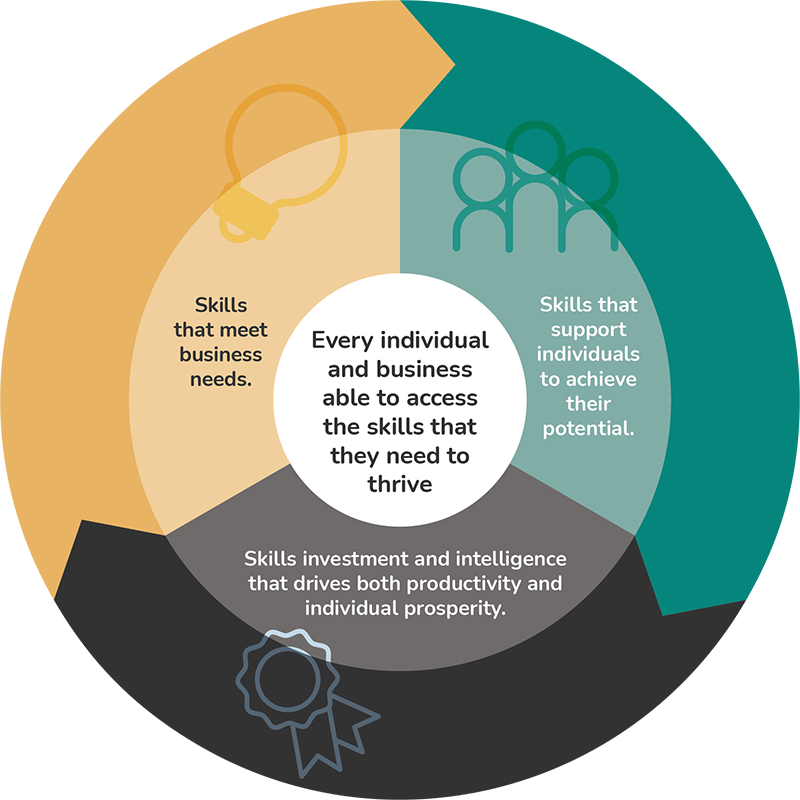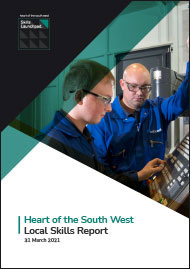4 Skills Strategy
Overview
Skills performance is a crucial element of any areas’ economic performance, determining its productivity, shaping local wellbeing, and underpinning its industrial and knowledge economy. As set out in Chapter 3, the Heart of the South West is no different, facing a range of social and economic opportunities and challenges over the next decade which require skills solutions if the area is to both achieve additional growth and address individual disparity. Bridging the gap between skills supply and demand will also need to be addressed if the area is to progress.

This core strategy seeks to provide that shared blueprint for the Heart of the South West. At its core is a shared vision that:
Every individual in the Heart of the South West should be able to access the skills they need to thrive in a productive job they value, supporting businesses, inclusion and growth.
This vision seeks to put the individual and their progression at the heart of our skills activity, ensuring positive life chances are extended to all. Through supporting and shaping individual advancement, we will provide our businesses with the skills they need to drive a more productive and inclusive economy. Through securing more skilled people, we will enable the area to better address the challenges and take up the opportunities it faces, supporting the economy and our communities to recover from the recent shocks associated with Covid-19, and providing a foundation for future prosperity.
To achieve this vision, the Heart of the South West will focus on three core objectives moving forward, which will drive and accelerate progress around skills delivery and performance. These are:
-
Ensure that our skills and training environment is responsive and forward facing, meeting business and individual need.
Working with our work based learning providers, whether colleges, independent providers and their networks, schools, universities, or other specialist provision (notably our IoTs. national centers of excellence and providers of community and enterprise education) to ensure that our delivery environment and provision is fit for purpose and able to support both existing business needs and future economic opportunities (notably within key sectors such as advanced engineering and production, clean growth, digital and creative industries, modern construction and health).
This in turn will seek to address ongoing challenges around individual achievement and business skills uptake, and mismatches between business demand and skills supply.
Activity will include joint working and projects to ensure that provision is shaped to fit with and drive forward local economic demand / opportunities; is responsive and flexible to both individual and business requirements; is able to support those furthest from the market; and provides a seamless and integrated training offer / escalator approach. To achieve this, partners will seek to best utilise and integrate new capital and revenue support to meet emerging economic opportunities and reinforce existing complimentary capacity, as well as seek to work together to ensure that recovery activity supports those with the greatest barriers to progression.
As part of the development of this approach, engagement with business and e onomic partners will also be crucial, ensuring that demand for roles is stimulated within key sectors; that workforce provision is business led and co-designed; that essential apprenticeships (at both tertiary and higher level) and other vocational pathways are consistently promoted; and the value of higher and technical skills to business performance demonstrated and championed. This will require joint working to ensure that demand led activity is fully funded (including resources for key business / provider partnerships) as part of the Heart of the South West’s overall skills approach.
-
Ensure that every individual can access the skills and training they need to achieve their own potential.
Working together to ensure that the Heart of the South West has a skills and training offer that can meet the needs of any individual and support them into or progress through a job which adds value to the wider economy. This will seek to address both the area’s challenges around individual productivity and economic performance; support wider efforts around extending opportunity to all and better enabling access regardless of individual barriers; and expand and enhance our shared labour market for higher, technical and high demand skilled.
Actions will include:
-
Working together to better support those with barrier to learning or work, developing a shared approach to improving social inclusion and mobility. This will include facilitating new community learning capacity and offers in our most deprived communities; enhancing outreach to our most vulnerable and hardest to reach individuals and young people; and seeking to improve wraparound support for those with a barrier to progression.
-
Providing enhanced careers advice guidance for young people and adults, particularly those with at risk of NEET or economic exclusion;
-
Improving training availability for those in and outside of work who may be able to upskill, but face another barrier to progression;
-
Making full use of new training and learning offers like the Lifetime Guarantee;
-
Securing additional support for those who are long term unemployed; and
-
Engaging and drawing upon other government led skills and work provision that can enable us to harness individual progression, including support for self-employment and enterprise activity which benefits the individual, and ensuring every individual has the digital skills they require to thrive.
This will require close working with businesses, to promote the opportunities involved in expanding and extending recruitment patterns; capture and fully market their career pathways and new opportunities to those in education and across the existing workforce; and increase demand for higher level skills, technical roles and staff able to lead and enable innovative growth and services.
-


